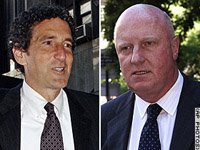Wednesday, January 18, 2006
Disclosure Rules To Reduce Executive Indictments
 The SEC is adopting new rules that will require greater disclosure of the compensation of senior executives. The announcement made it clear that there is no intention to limit the amount CEOs can take, but just to let the shareholders know about the little extras such as stock options, personal use of the corporate jet, and agreements to pay for the CEO's newspapers for life. Options are already disclosed, of course, but currently the corporation says they are worthless.
The SEC is adopting new rules that will require greater disclosure of the compensation of senior executives. The announcement made it clear that there is no intention to limit the amount CEOs can take, but just to let the shareholders know about the little extras such as stock options, personal use of the corporate jet, and agreements to pay for the CEO's newspapers for life. Options are already disclosed, of course, but currently the corporation says they are worthless.A lot of people dispute the Chuckles Curve (see "The Economics of Executive Compensation", December 18), argue that CEO compensation is excessive, and doubt this added disclosure will do anything to further the war against obscenity. One commented "you can't embarrass someone making $40 million a year". They note that average worker pay has been nearly flat at $27,000 from 1990 to 2004, adjusted for inflation, while average CEO pay has risen from $2.82 million to $11.8 million. Other experts think that there might be some limiting effect from something they call "outrage restraint". The problem of course is figuring out exactly when this sets in.
I think both views entirely miss the point, and that enhanced disclosure will matter a great deal. A number of years ago it was common to see the corporate logo on the tail of corporate jets. Do you see any today? No-sir-re-Bob. One year some reporters listed all the logos at the airport during the super bowl and bingo, the logos were all removed before the next bowl. If the value of personal use of the jet has to go in the proxy, you can expect most companies to install a third seat so the value can be reported at tourist rates, and to schedule most personal use leaving Thursday after 5 and returning by Tuesday to get the weekend special. Executives do care about their image.
But that will not be the biggest change. Recently a number of executives have been indicted for looting their company illegally. The difference between looting it legally and looting it illegally involves opaque legal concepts of course, but it really comes down to whether the board approved it while awake and in their right minds, and weren't duped. The new rules will really help, because if you are skimming $100 million or so and it is fully disclosed in the proxy, the ineffectual squeals of the stockholders should alert the board to the point where they really can't preserve deniability or dupability. Do you have any idea what avoiding those criminal trials will save the taxpayer?